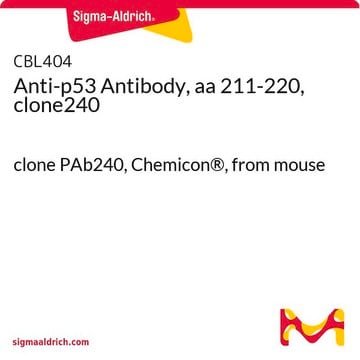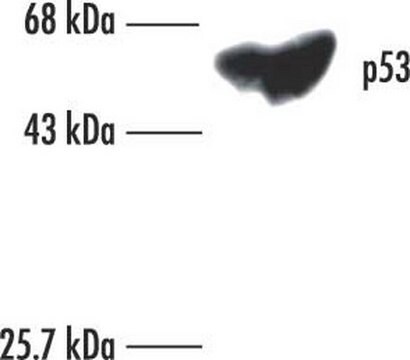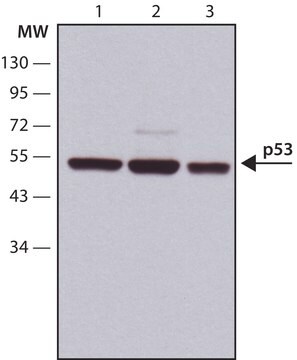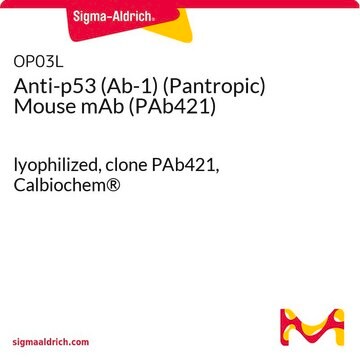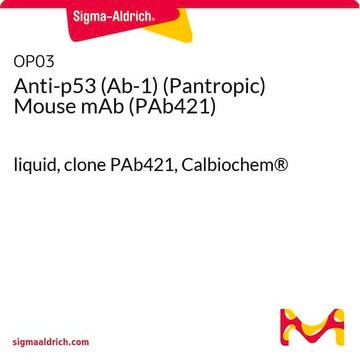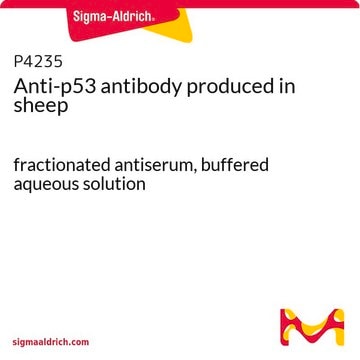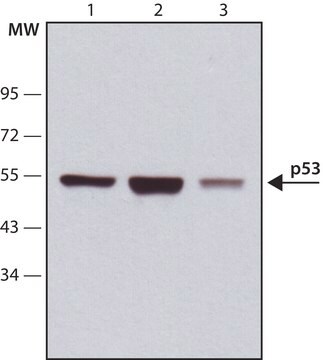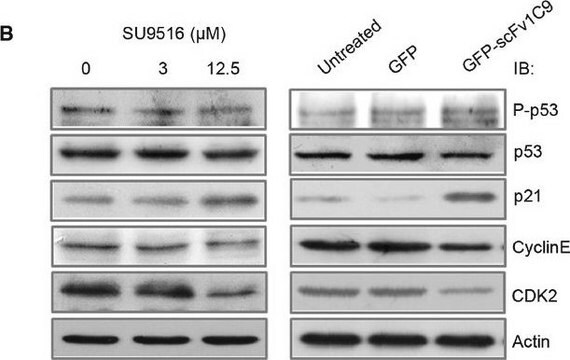추천 제품
생물학적 소스
mouse
Quality Level
항체 형태
purified immunoglobulin
항체 생산 유형
primary antibodies
클론
PAb421, monoclonal
종 반응성
human, mouse
기술
immunohistochemistry: suitable
immunoprecipitation (IP): suitable
western blot: suitable
동형
IgG2aκ
NCBI 수납 번호
UniProt 수납 번호
배송 상태
wet ice
타겟 번역 후 변형
unmodified
유전자 정보
mouse ... Trp53(22059)
일반 설명
p53 was discovered in 1979 as a cellular protein associating with the transforming protein of SV40 tumor virus. Since then, many different biochemical functions have been attributed to the 53 kDa phosphoprotein. Experimental evidence has suggested that p53 acts as a negative regulator of cell growth in normal cells). Thus, the inactivation or mutation of p53 may be an essential step in the development of malignancy. Wild-type p53 levels in normal cells and tissues were found to be very low. Mutant p53 polypeptide, however, is often found to be present at high concentrations in mammalian tumors and tumor cell lines. For example, in an immuno-histochemistry study 40% of human breast cancer showed elevated levels of mutant p53 in the cell nucleus. Mutations of the p53 protein have some characteristic features: Most of them are missense point mutations giving rise to an altered protein function. Also, many, but not all, mutant p53 proteins exhibit a common mutant structure, which can be recognized by monoclonal antibodies specific for p53 in the mutant conformation.
특이성
This antibody recognizes amino acids 376-378 of human p53.
면역원
Epitope: Amino acids 376-378 in human p53
Partially purified mouse p53
애플리케이션
Immunoprecipitation Analysis: A representative lot from independent laboratory immunoprecipitated p53 in IP (Lehman, T. A., et al. (1991). Cancer Res. 51(15):4090-4096.; Harlow, E., et al. (1981). J Virol. 39(3):861-869.)
Immunohistochemistry Analysis: A representative lot from an independent laboratory detected p53 in human breast cancer tissue (Davidoff, A. M., et al. (1992). Proc Natl Acad Sci USA. 89(8):3439-3442.).
Immunohistochemistry Analysis: A representative lot from an independent laboratory detected p53 in human breast cancer tissue (Davidoff, A. M., et al. (1992). Proc Natl Acad Sci USA. 89(8):3439-3442.).
Research Category
Epigenetics & Nuclear Function
Epigenetics & Nuclear Function
Research Sub Category
Cell Cycle, DNA Replication & Repair
Cell Cycle, DNA Replication & Repair
Use Anti-p53 Antibody, clone PAb421 (Mouse Monoclonal Antibody) validated in WB, IP, IHC to detect p53 also known as Cellular tumor antigen p53, Tumor suppressor p53.
품질
Evaluated by Western Blot in mouse brain tissue lysate.
Western Blot Analysis: 1 µg/mL of this antibody detected p53 in 10 µg of mouse brain tissue lysate.
Western Blot Analysis: 1 µg/mL of this antibody detected p53 in 10 µg of mouse brain tissue lysate.
표적 설명
~53 kDa observed
물리적 형태
Format: Purified
Protein G Purified
Purified mouse monoclonal IgG2aκ in buffer containing 0.1 M Tris-Glycine (pH 7.4), 150 mM NaCl with 0.05% sodium azide.
저장 및 안정성
Stable for 1 year at 2-8°C from date of receipt.
Note: Variability in freezer temperatures below -20°C may cause glycerol containing solutions to become frozen during storage.
Note: Variability in freezer temperatures below -20°C may cause glycerol containing solutions to become frozen during storage.
분석 메모
Control
Mouse brain tissue lysate
Mouse brain tissue lysate
기타 정보
Concentration: Please refer to the Certificate of Analysis for the lot-specific concentration.
면책조항
Unless otherwise stated in our catalog or other company documentation accompanying the product(s), our products are intended for research use only and are not to be used for any other purpose, which includes but is not limited to, unauthorized commercial uses, in vitro diagnostic uses, ex vivo or in vivo therapeutic uses or any type of consumption or application to humans or animals.
적합한 제품을 찾을 수 없으신가요?
당사의 제품 선택기 도구.을(를) 시도해 보세요.
Storage Class Code
12 - Non Combustible Liquids
WGK
WGK 1
Flash Point (°F)
Not applicable
Flash Point (°C)
Not applicable
시험 성적서(COA)
제품의 로트/배치 번호를 입력하여 시험 성적서(COA)을 검색하십시오. 로트 및 배치 번호는 제품 라벨에 있는 ‘로트’ 또는 ‘배치’라는 용어 뒤에서 찾을 수 있습니다.
S C Kaul et al.
Neoplasia (New York, N.Y.), 3(2), 110-114 (2001-06-23)
The mouse mot-2 protein was earlier shown to bind to the tumor suppressor protein, p53. The mot-2 binding site of p53 was mapped to C-terminal amino acid residues 312-352, which includes the cytoplasmic sequestration domain. In the present study, we
T Okamoto et al.
Oncogene, 19(54), 6194-6202 (2001-02-15)
The Y-box binding protein, YB-1, belongs to a family of multifunctional proteins which regulate gene expression on both transcriptional and translational levels. The tumor suppressor gene p53 displays growth suppressive properties by regulating gene expression through transcriptional regulation. We now
Hidetaka Uramoto et al.
The Biochemical journal, 371(Pt 2), 301-310 (2003-01-22)
The CCAAT-binding transcription factor (CTF)/nuclear factor I (NF-I) group of cellular DNA-binding proteins recognizes the sequence GCCAAT and is implicated in eukaryotic transcription, as well as DNA replication. Molecular analysis of human CTF/NF-I cDNA clones revealed multiple mRNA species that
Shuting Jia et al.
International journal of biological sciences, 8(5), 596-605 (2012-05-04)
The loss of wild type p53 tumor suppressive function and oncogenic gain-of-function of p53 mutants have been showing important implications in tumorigenesis. The p53(N236S) (p53(N239S) in human, p53S) mutation has been shown to lose wild type p53 function by yeast
Rie Takahashi et al.
The Journal of investigative dermatology, 134(3), 791-800 (2013-09-17)
The TP53 gene encodes 12 distinct isoforms, some of which can alter p53 activity in the absence of genomic alteration. Endogenous p53 isoforms have been identified in cancers; however, the function of these isoforms remains unclear. In melanoma, the frequency
자사의 과학자팀은 생명 과학, 재료 과학, 화학 합성, 크로마토그래피, 분석 및 기타 많은 영역을 포함한 모든 과학 분야에 경험이 있습니다..
고객지원팀으로 연락바랍니다.